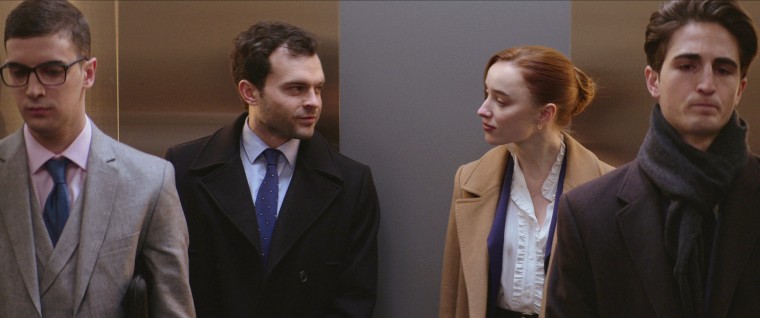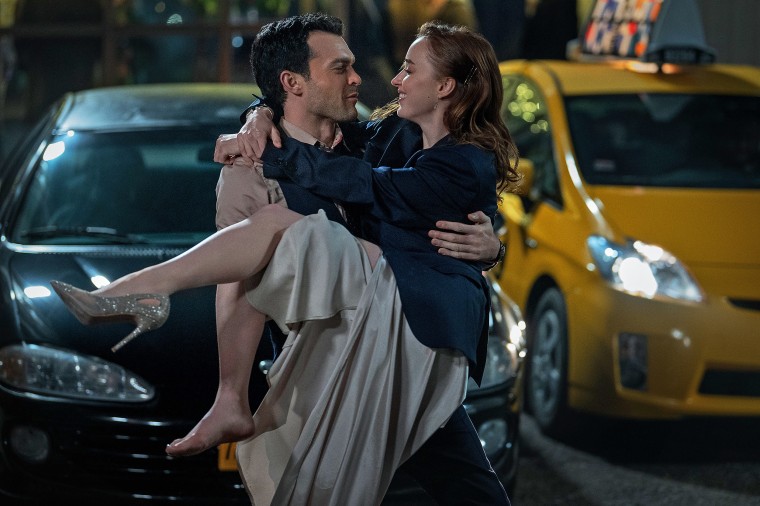Warning: This post contains spoilers about the ending of "Fair Play."
How can society dismantle toxic links between female empowerment and male fragility? How can women learn to embrace their successes without fearing it will inadvertently but inevitably hurt them? How can we liberate men from the roles they think they're supposed to fill?
These are the questions that writer and director Chloe Domont wants you to ask yourself after watching “Fair Play,” which dropped on Netflix in October.

The erotic thriller follows those threads through Emily (Phoebe Dynevor) and Luke (Alden Ehrenreich), a newly engaged couple working for the same investment bank in NYC. Soon, keeping their secret from their colleagues goes from sexy to ... well, scary.
When Emily gets a promotion they both thought Luke was destined for, their relationship begins to unravel. Emily's guilt undermines the confidence she needs to thrive at the firm. Luke's jealousy fuels a spiteful rage that clouds his own performance. As for their relationship? Forget about it.
“When she gets the promotion, her first reaction isn’t excitement, it’s fear,” says Domont. “She knows that this is a man with a fragile ego.”
“(Emily) knows that Luke is a man who’s, when he’s on a high, and when he’s feeling good about himself, his love is intoxicating ... But at the same time, she knows that there’s this feeling inside of him that he needed to get there first, that he only feels good when he’s achieving and accomplishing things.”
The climax of the film involves Luke messily revealing their relationship at a meeting, and one of cinema's messiest engagement parties. Then, what begins as a consensual sexual encounter turns into assault when Emily begs Luke to stop, but he continues.
Domont says that she always knew the film had to drastically escalate in order to work.
“I set out to make a thriller about power dynamics on the ugliest level,” she says. “It’s a genre that uses violence as a means to solve conflict.”
Viewers are left with a tense and powerful ending. Emily returns home to find Luke in the apartment with packed bags. Divvying up their belongings, Luke says he's moving to San Francisco. Emily then takes a knife, forces Luke to his knees, draws blood from his arm and makes him beg and admit that he not only raped her, but also admit, “I am nothing.”
This ending is about Emily reclaiming the power that Luke takes away from her when he sexually assaulted her, says Domont.
“This is a man who has cut (Emily) down on every single level, through emotional abuse, verbal abuse, and physical assault.”
Domont says their power struggle actually starts at the beginning, all the way at the proposal — with Luke on his knees asking Emily to marry him. Emily hesitates before issuing an "OK."
“I’m sure there’s hesitation there because there have been red flags, red flags that she chooses to ignore in the moment because she does love him and because she is taken away by the romance of it,” says Domont.

The beginning and ending scenes are parallel bookends, with Luke on his knees, blood being drawn, and a charged dynamic.
At the beginning, it's one of attraction. At the end, it's repulsion.
“This is a man who has caused so much pain and destruction not just to her, but also to himself,” says Domont. “He cannot face accountability, he cannot face his own failures, he cannot face his own weaknesses.”
Domont says Luke’s character wasn't written in a bubble, but in response to what she says is a "crisis of masculinity."
“I think a big crisis of masculinity (is) going on, not just in the country, but around the world,” she says. “This is the first time that girls are surpassing boys in education, this is the first time women are surpassing men in the workforce… this is where we’re at. And we don’t know how to talk about these things."
"Fair Play," at least, is trying to start the conversation.
